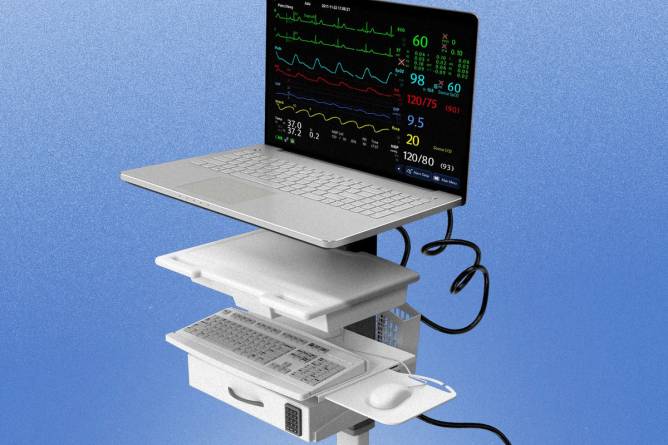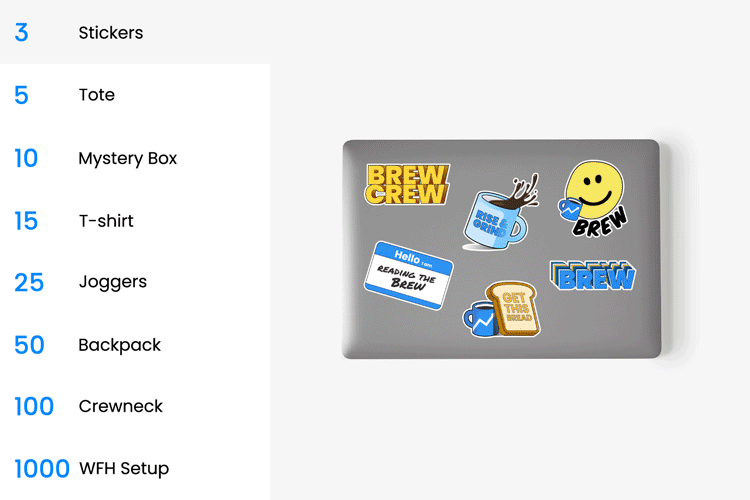Happy Monday! As you fill up your online carts with cyber steals today, the ladies of Healthcare Brew want to remind you that it’s time to throw out your Thanksgiving leftovers. And that’s not just coming from us; it’s also coming from the USDA. We hope you enjoyed your turkey, stuffing, and cranberry sauce sandwiches while you had the chance!
In today’s edition:
 VC ethics in healthcare VC ethics in healthcare
 OTC hearing aids OTC hearing aids
 ️ Medical supplies ️ Medical supplies
—Maia Anderson, Shannon Young
|
|
Claudenakagawa/Getty Images
Venture capital (VC) firms typically inject money into startups to get them off the ground. But General Catalyst, which was founded in 2000 and is now one of the largest VC firms in the US, has plans for a different kind of partnership: acquiring and operating a health system.
In early October, the VC firm created a healthcare company called the Health Assurance Transformation Corporation, or HATco, co-founded and helmed by former Intermountain Health CEO Marc Harrison, and announced HATco’s intention to buy a health system.
“HATCo’s charter is not to disrupt healthcare systems; rather, it is to be in service of healthcare organizations everywhere to change how they deliver a fundamentally better experience for consumers—and to prove the transformative effect of a true partnership between technologists, caregivers and capital,” Harrison and Hemant Taneja, CEO and managing director of General Catalyst, wrote in a blog post.
Keep reading here.—MA
Do you work in healthcare or have information about the industry that we should know? Email Maia at [email protected]. For confidential conversations, ask Maia for her number on Signal.
|
|
PRESENTED BY GE HEALTHCARE
|
It’s been a busy week in healthcare (like most weeks in healthcare). But this week’s extra special because the Radiological Society of North America (RSNA) is holding their 109th Scientific Assembly and Annual Meeting in Chicago. And this year, they’re unveiling some new, exciting changes.
RSNA started yesterday and runs until Wednesday, Nov. 29—but already, GE HealthCare has introduced over 40 new solutions that aim to improve patient care and increase healthcare efficiency.
All of these solutions are working toward a lot of big, significant goals, like:
-
addressing the root cause of provider burnout
- innovating to help clinicians feel better supported
- helping providers deliver where and when patients need it
- demonstrating how data science and tech can improve care
Learn more about GE HealthCare’s new drop and how they can help overcome even the biggest healthcare industry hurdles.
|
|
Photo Illustration: Dianna “Mick” McDougall, Source: Getty Images
Hearing aids have been available for sale without a prescription in the US for more than a year. But the over-the-counter (OTC) devices, which were billed as more accessible and affordable than their prescription counterparts, have not exactly flown off store shelves—at least not yet.
Industry experts and audiologists attribute the relatively slow embrace of OTC hearing devices to three primary factors: price tags that can range from $90 to $5,000+, varied insurance coverage (if any), and a lack of competition between big-name tech companies. Still, it’s hard to gauge the exact demand for these OTC devices since “no organization is tracking sales,” the Hearing Industries Association (HIA) noted in a presentation last month.
Alicia Spoor, past president of the Academy of Doctors of Audiology, told Healthcare Brew that the OTC hearing aid market hasn’t seen a lot of new players after the FDA rule allowing nonprescription device sales took effect in October 2022. Instead, she said, it’s largely been dominated by legacy prescription hearing aid manufacturers with new OTC offerings alongside some smaller OTC brands.
Keep reading here.—SY
Do you work in healthcare or have information about the industry that we should know? Email Shannon at [email protected]. For confidential conversations, ask Shannon for her number on Signal.
|
|
Francis Scialabba
In recent years, private equity (PE) firms have acquired companies across the healthcare industry, from dental support organizations to those focused on value-based care. But they’re not stopping there: PE firms are also acquiring companies that make medical supplies.
PE firms have increasingly bought up medical equipment companies over the last decade, which has led to cost-cutting strategies that, at times, can compromise patient care, according to a report from nonprofits the Private Equity Stakeholder Project (PESP) and the National Disability Rights Network.
“Due to the private equity industry’s extreme focus on profit, patients are forced to endure potentially life-threatening delays, costs, and legal hurdles to access the equipment needed to manage their health,” PESP said in a statement.
Keep reading here.—MA
|
|
TOGETHER WITH CVS CAREMARK
|
|
Introducing GLP-1s: There’s a groundbreaking new medication in town. GLP-1 drugs are changing how doctors can treat obesity, but they’re pricey. We learned how CVS Caremark is helping plan sponsors keep costs down. Read on.
|
|
Level up your career with these resources from our sponsors!
|
|
Francis Scialabba
Today’s top healthcare reads.
Stat: Half of assisted living facility operators make margins that are upwards of 20%—much higher than most other healthcare facilities. (the New York Times)
Quote: “As far as a fundraiser, I don’t know if we’ve ever seen something kind of raise as much money as Casey’s campaign has as quickly as it has.”—Daniel Lempert, a spokesperson for RIP Medical Debt, a nonprofit that buys bundles of medical debt for low-income patients, on a terminal cancer patient’s effort to erase $19 million in medical debt (the New York Times)
Read: Vaccine nerds are excited about the new Novavax Covid-19 shot. (KFF Health News)
Eyes on radiologists: The Association of American Medical Colleges projects a shortage of up to 41.9k radiologists in the US—and burnout is running high. Learn how GE HealthCare’s solutions are addressing this challenge.* Tech talk: Register for our upcoming virtual event to hear from Dr. David Reich, president of Mount Sinai Hospital. Tune in Nov. 30 to learn how tech is transforming the healthcare system + creating better patient experiences. Sponsored by Typeform.* *A message from our sponsor.
|
|
ADVERTISE
//
CAREERS
//
SHOP
//
FAQ
Update your email preferences or unsubscribe
here.
View our privacy policy
here.
Copyright ©
2023
Morning Brew. All rights reserved.
22 W 19th St, 4th Floor, New York, NY 10011
|
|











